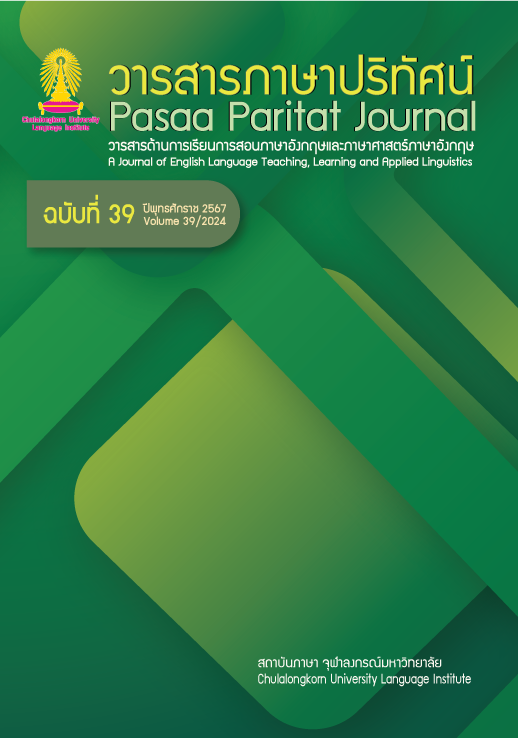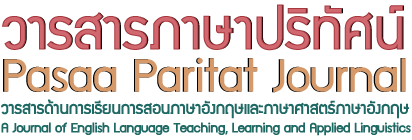การส่งเสริมศักยภาพครูผ่านการฝึกอบรมเกี่ยวกับการวิจัยเชิงปฏิบัติการเชิงสำรวจ
DOI:
https://doi.org/10.58837/CHULA.PPJ.39.13คำสำคัญ:
การวิจัยเชิงปฏิบัติการเชิงสำรวจ, การพัฒนาวิชาชีพ, การวิจัยในชั้นเรียน, การฝึกปฏิบัติการสอนบทคัดย่อ
การพัฒนาวิชาชีพเป็นข้อกำหนดสำหรับครูในโรงเรียนของประเทศไทยเพื่อการประเมินผลประจำปี การมีส่วนร่วมในการวิจัยครูอาจเป็นตัวเลือกหนึ่งเพื่อพัฒนาวิชาชีพสําหรับครูในโรงเรียน ทั้งนี้การวิจัยเชิงปฏิบัติการเชิงสำรวจ (Exploratory Action Research: EAR) เป็นการวิจัยประเภทหนึ่งที่ได้รับการนำเสนอให้แก่ครูในชั้นเรียนระดับประถมศึกษาและมัธยมศึกษาในประเทศไทย จากความร่วมมือระหว่างบริติช เคานซิล ประเทศไทย และ มหาวิทยาลัยเทคโนโลยีพระจอมเกล้าธนบุรี การฝึกอบรมนำร่องเกี่ยวกับ EAR เริ่มต้นขึ้นในปี ค.ศ.2022 โดยมีวัตถุประสงค์เพื่อให้ครูมีความรู้และทักษะในการดำเนินการ EAR ในระหว่างการอบรมผู้เข้ารับการฝึกอบรมได้รับคำแนะนำจากผู้ฝึกสอนสองคนผ่านระบบ webinars และได้รับคำแนะนำจากที่ปรึกษาสองคนผ่านการให้คำปรึกษาออนไลน์เพื่อให้การดำเนินการ EAR สมบูรณ์ การวิจัยนี้ดำเนินการเพื่อตรวจสอบว่าการฝึกอบรมดังกล่าวได้เปลี่ยนแปลงครูอย่างไรบ้าง ด้วยคำแนะนำจากที่ปรึกษาสองคนและการมีส่วนร่วมโดยสมัครใจ ครูเจ็ดคนได้รับการสัมภาษณ์ ผลการวิจัยเผยให้เห็นทั้งประโยชน์และความท้าทาย ครูมีการเปลี่ยนแปลงความเชื่อที่มีต่อการวิจัยและการสอนอย่างมีนัยสำคัญ การวิจัยในชั้นเรียนเป็นสิ่งที่มีประโยชน์ในทางปฏิบัติเพราะสามารถแก้ไขปัญหาในชั้นเรียนได้อย่างเป็นระบบ นอกจากนี้ครูในโรงเรียนยังได้รายงานการสร้างความสัมพันธ์กับนักเรียนซึ่งเป็นสิ่งที่สําคัญอีกด้วย ดังนั้นการฝึกอบรม EAR จึงได้หล่อหลอมบทบาทของครูในโรงเรียนไปสู่การเป็นครู-นักวิจัยได้
เอกสารอ้างอิง
Avalos, B. (2011). Teacher professional development in teaching and teacher education over ten years. Teaching and Teacher Education, 27(1), 10–20. https://doi.org/10.1016/j.tate.2010.08.007
Borko, H. (2004). Professional development and teacher learning: Mapping the terrain. Educational Researcher, 33(8), 3–15. https://doi.org/10.3102/0013189X033008003
Burns, A. (2017). Research and the teaching of speaking in the second language classroom. In E. Hinkel (Ed.), Handbook of research in second language teaching and learning (pp. 242–256). Routledge.
Castleberry, A., & Nolen, A. (2018). Thematic analysis of qualitative research data: Is it as easy as it sounds? Currents in Pharmacy Teaching and Learning, 10(6), 807–815. https://doi.org/10.1016/j.cptl.2018.03.019
Darling-Hammond, L. (2017). Teacher education around the world: What can we learn from international practice? European Journal of Teacher Education, 40(3), 291–309. https://doi.org/10.1080/02619768.2017.1315399
Darling-Hammond, L., Hyler, M. E., & Gardner, M. (2017). Effective teacher professional development. Learning Policy Institute. https://doi.org/10.54300/122.311.
Dempsey, N. P. (2010). Stimulated recall interviews in ethnography. Qualitative Sociology, 33(3), 349–367. https://doi.org/10.1007/s11133-010-9157-x
Desimone, L. M. (2009). Improving impact studies of teachers’ professional development: Toward better conceptualizations and measures. Educational Researcher, 38(3), 181–199. https://doi.org/10.3102/0013189X08331140
Desimone, L. M., & Pak, K. (2017). Instructional coaching as high-quality professional development. Theory Into Practice, 56(1), 3–12. https://doi.org/10.1080/00405841.2016.1241947
Fishman, B. J., Penuel, W. R., Allen, A.R., Cheng, B. H., & Sabelli, N. (2013). Design-based implementation research: An emerging model for Transforming the relationship of Research and practice. Teachers College Record, 115(14), 136–156. https://doi.org/10.1177/016146811311501415
Garet, M. S., Porter, A. C., Desimone, L., Birman, B. F., & Yoon, K. S. (2001). What makes professional development effective? Results from a national sample of teachers. American Educational Research Journal, 38(4), 915–945. https://doi.org/10.3102/00028312038004915
Herr, K., & Anderson, G. L. (2015). The action research dissertation: A guide for students and faculty. Sage Publications.
Ingersoll, R., Merrill, E., Stuckey, D., & Collins, G. (2018). Seven trends: The transformation of the teaching force. Consortium for Policy Research in Education, University of Pennsylvania. https://repository.upenn.edu/bitstreams/e5d6f59f-18ee-4eee-a884-4fc85714f103/download
Kennedy, M. M. (2016). How does professional development improve teaching? Review of Educational Research, 86(4), 945–980. https://doi.org/10.3102/0034654315626800
Mills, G. E. (2011). Action research: A guide for the teacher researcher. Pearson.
Opfer, V. D., & Pedder, D. (2011). Conceptualizing teacher professional learning. Review of Educational Research, 81(3), 376-407. https://doi.org/10.3102/0034654311413609
Rebolledo, P., Smith, R., & Bullock, D. (Eds.) (2016). Champion teachers: Stories of Exploratory action research. British Council. https://www.teachingenglish.org.uk/sites/teacheng/files/pub_british_council_champion_teachers_1.pdf
Sagor, R. (2011). The action research guidebook: A four-step process for educators and school teams (2nd ed.). Corwin.
Serin, H. (2018). A comparison of teacher-centered and student-centered approaches in educational settings. International Journal of Social Sciences & Educational Studies, 5(1), 164–167. https://doi.org/10.23918/ijsses.v5i1p164
Smith, R. (2015) Exploratory action research as workplan: Why, what and where from? In Dikilitas, K., Smith, R. & Trotman, W (Eds.) Teacher-researchers in action (pp. 37–45.) IATEFL Research Special Interest Group.
Smith, R. & Rebolledo, P. (2018). A handbook for exploratory action research. British Council.
Yoon, K. S., Duncan, T., Lee, S. W.Y., Scarloss, B., & Shapley, K. (2007). Reviewing the evidence on how teacher professional development affects student achievement (Issues & Answers Report, REL 2007–No. 033). U.S. Department of Education, Institute of Education Sciences, National Center for Education Evaluation and Regional Assistance, Regional Educational Laboratory Southwest. https://ies.ed.gov/ncee/edlabs/regions/southwest/pdf/rel_2007033.pdf
ดาวน์โหลด
เผยแพร่แล้ว
รูปแบบการอ้างอิง
ฉบับ
ประเภทบทความ
สัญญาอนุญาต
ลิขสิทธิ์ (c) 2024 วารสารภาษาปริทัศน์

อนุญาตภายใต้เงื่อนไข Creative Commons Attribution-NonCommercial-NoDerivatives 4.0 International License.



